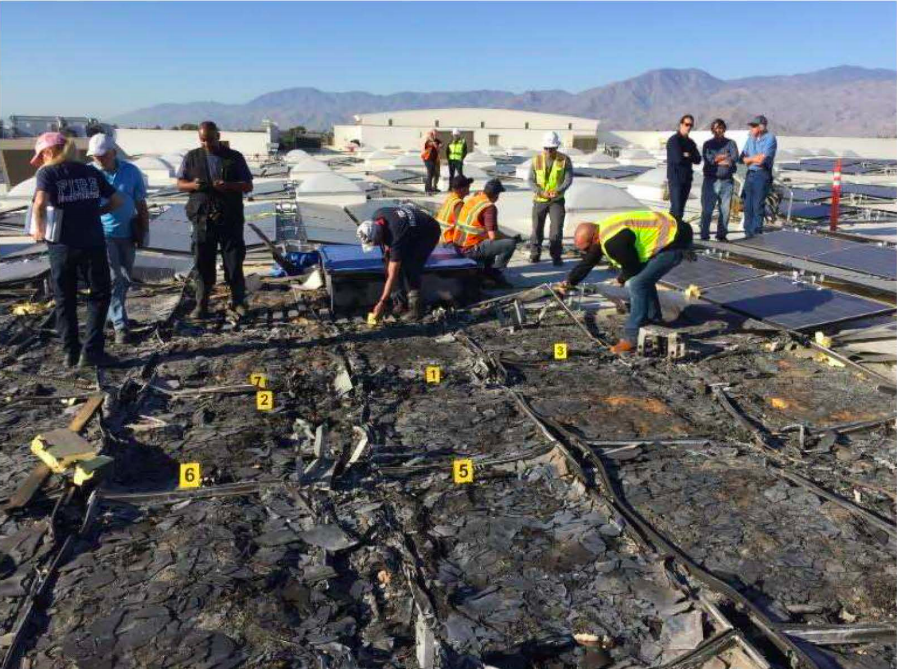- Walmart claims in a new lawsuit that Tesla was negligent in operating and managing 244 solar-roof contracts it had with the retailer.
- Walmart’s complaint said Tesla’s negligence resulted in fires in at least seven cases. Those fires resulted in store closings and millions in lost merchandise.
- It’s likely that none of this would have happened if Tesla hadn’t acquired the solar-services company SolarCity, which some critics said was a mistake in the first place.
- Now, Tesla is facing its most powerful legal adversary ever at a time when company resources are wearing thin.
- Tesla did not respond to Business Insider’s repeated requests for comment.
Tesla is now in the ring with what is probably the most dangerous adversary in its history: Walmart.
In a new lawsuit, the giant retailer is accusing Tesla of negligence in its management of solar roofs that caught fire at over half a dozen Walmart stores.
As of November, no fewer than seven Walmart stores with solar roofs owned and managed by Tesla had caught fire, prompting store closings and damaging millions of dollars’ worth of merchandise. A Walmart in Beavercreek, Ohio, was closed for eight days after a fire that sparked from Tesla’s solar panels.
In its complaint, Walmart said Tesla offered no explanation for why these panels were combusting. The suit also said that Tesla had no accurate drawings of the solar panels and no processes or employees trained in inspecting or fixing them. In fact, according to the suit, Walmart employees had to show Tesla employees where there were cracks and temperature issues on the solar panels (which, again, Tesla owned and operated).
All of this could have been avoided had Tesla not committed what some on Wall Street consider its most critical miscalculation: the acquisition of SolarCity in 2016.
If you know anything about how Tesla deals with fixing its solar panels, email this reporter at [email protected].
Original SolarCity sin
Tesla's acquisition of the solar-services company SolarCity was an all-stock deal that Tesla CEO Elon Musk said would turn Tesla into a vertically integrated renewable-energy juggernaut.
But that's just what Musk was saying. Analysts across Wall Street were more circumspect. SolarCity, helmed by Musk's cousin, Lyndon Rive, was going bankrupt and heavily in debt in 2016. Just before Musk announced that he was offering to buy it, Goldman Sachs said SolarCity was the "worst positioned" for growth in its sector. Ultimately, the company added another $700 million in cash burn a quarter to Tesla's already-strained balance sheet.
But that didn't matter. Musk - who was both on the board of SolarCity and running Tesla - got the deal done. Since then, SolarCity has been a money suck - experiencing rounds and rounds of layoffs and failing to sell its much-anticipated solar roofs and Powerwalls in any meaningful way. Only 12% of solar-energy installers surveyed in December and January by the North American Board of Certified Energy Practitioners even carried the Powerwall, a home battery that stores solar energy.
And now Tesla has drawn the ire of Walmart, which started working with SolarCity back in 2010. Walmart's complaint spent some time examining this controversial deal and claimed that Tesla inherited and amplified existing incompetence at SolarCity.
Tesla's inspections of Walmart's properties found 157 action items requiring repairs or replacements of systems of components as of earlier this month, according to the complaint. Walmart thinks that count is low. That is in part why it "de-energized" its buildings - stopped using Tesla's product - after it ran into trouble.
"On information and belief, the actual conditions are worse than as documented by Tesla," Walmart said in its complaint, "based on Tesla's history of deficient and incompetent inspections, including Tesla's reliance on untrained, unqualified, and unsupervised personnel to install and maintain the systems."
Walmart said Tesla allowed issues with SolarCity to linger as part of a culture of defects and a desperation for cash that it said led Tesla to install systems too fast. The lawsuit also accuses Tesla of filing reports that said Tesla had made repairs to Walmart's roofs when it had not.
Someone its own size
According to the complaint, Walmart seeks to break the 244 open contracts it has with Tesla, accusing Tesla of violating its obligation "to install, operate, and maintain the solar panel systems safely, nonnegligently, and in accordance with prudent industry practices."
This may well be the fiercest legal adversary Tesla has ever faced, and the company's legal resources are stretched as it is.
Tesla and Musk have faced legal challenges of all kinds. Some are small cases: individuals asking the company to return deposits they put on cars they no longer want, customers with warranty issues, suppliers suing for backpay. Some instances are strange, like the case of Vernon Unsworth, the diver who is suing Musk for calling him a pedophile on Twitter. Back in May a judge ruled that the matter would go to trial on October 22.
Tesla has been sued by shareholders and run afoul of US regulators, but it has never had a corporate adversary as invested and determined as Walmart. This could be tough for a company that sees a lot of legal turnover. Tesla switched its representation for the Securities and Exchange Commission suit a few times, for example. Back in February, this happened rather publicly when a high-profile lawyer quit just a day or two after Musk made a statement that may have violated an SEC agreement.
In other words, this appears to be the first time Tesla will truly need to have all of its legal ducks in a row. It did not tell its shareholders when Walmart, obviously a huge customer, stopped using its systems. Tesla has SolarCity loans to pay and potentially angry customers to answer to. In fact, everyone will want answers.
Here are a few questions we asked Tesla that the company did not respond to:
- Did Tesla ever disclose the loss of Walmart's business to shareholders?
- Did Tesla ever disclose the loss of Walmart's business to SolarCity bondholders?
- Is Tesla concerned about possible class actions related to SolarCity roofs now?
- Does Tesla have insurance that would cover a lawsuit like that?
- Have other customers (homeowners or businesses) experienced fires like this?
This is all happening at a time when Tesla is weak. The company just had a disastrous second-quarter earnings release, and its stock is down 32% for the year.
On top of all of this, there are reputational issues this lawsuit could raise for the company. This lawsuit is coming just as the German rental-car company Nextmove, one of the largest Tesla fleet owners, canceled a $5.55 million order from Tesla. In a 24-minute video explaining his decision, Nextmove CEO Stefan Moeller said that Tesla kept sending his company cars riddled with defects and that Tesla had no process for ensuring that those defects were tracked and taken care of.
"From our point of view Tesla has no process for a defect-free delivery," he said.
If you know anything about how Tesla deals with fixing its solar panels, email this reporter at [email protected].

